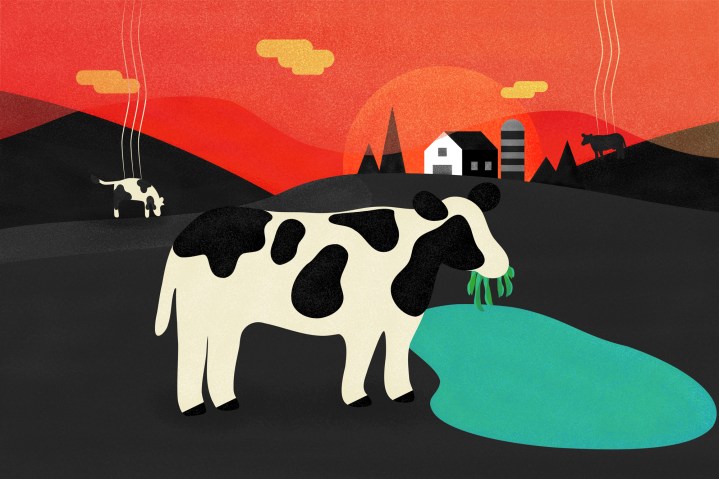

To milk is a verb that means to draw milk from a cow or other animal, either by hand or mechanically. To Remilk, meanwhile, apparently means to manufacture cheese, milk, and assorted other dairy products in a lab using a patented process that replicates the properties of dairy proteins without the need for cows or other livestock.
Of these two definitions, you’re almost certainly a lot more familiar with the first. However, if the folks at an Israeli cellular food company of that name — and the people who just invested $11.3 million in funding in them — are correct, you’re about to get a whole lot better acquainted with the second.
From clean meat to clean milk
Most people are, by now, familiar with the dream of cellular “clean meat,” the idea of producing animal flesh that doesn’t require the actual killing of an animal. This isn’t the same mission as companies like Impossible Foods (makers of the bleedable veggie burger) or the startup that manufactures “shrimp” out of bioengineered red algae. These are companies, producing everything from steak to foie gras, that are functionally identical to the real thing. The only difference? No animals need to be hurt to make (or, rather, to grow) them.
Remilk promises the same thing. Only instead of creating meat, it makes lab-grown dairy, essentially fulfilling the other main function of a cattle farm. If it lives up to the hype, it could be “game over,” said CEO and co-founder Aviv Wolff, for the traditional dairy industry.
In such a critical time for our planet, each one of us should contribute his part in our struggle against the climate crisis.
For us in Remilk, we aim to contribute our part by creating dairy products that are better for humans, for cows, and for our planet. pic.twitter.com/eXbsQyJboa— Remilk (@Remilk_Foods) October 31, 2020
“You have to put a lot of resources and energy to create a 900-kilogram animal,” Wolff told Digital Trends.
Even if you discount the moral question of whether it’s right to breed cows for slaughter or milking, the dairy industry poses problems. Cows cost money and resources to breed and grow to maturity. They also output no shortage of greenhouse gas emissions and manure, which can degrade the local water resources. Their farming can also have a detrimental impact on local wetlands and prairies. However, people continue to buy dairy products because, well, simply put: folks are selfish and it’s delicious.
All about the microbes
“I think I’m a perfect example of someone who’s consuming dairy products, even though I’m highly aware of the destructiveness of this industry,” Wolff said. “I came to the realization that if I’m someone who is [very aware of the impact the dairy industry has] and I cannot make the transition towards a fully vegan diet, the average person probably won’t be able to either. Our mission at Remilk is not to change the demand of the consumers, but to change the supply of products.”
Wolff described milk proteins as “the most unique proteins in nature.” Substitutes, such as vegan cheese or non-dairy yogurt, exist; they just don’t taste great. This is where Remilk — which was co-founded by Wolff and his biochemistry Ph.D. co-founder Ori Cohavi — hopes to enter the picture. “We outcompete traditional dairy production in every parameter you can think of — in terms of the amount of water that we need, the amount of feedstock we need, the amount of time and energy that we need,” he said.

Remilk’s process uses something called microbial fermentation in which milk proteins are reproduced in a tank to create real dairy that’s functionally identical to cow milk without the need for a cow.
“It can take just two to three days until these microbes multiply enough to fully fill the tank,” Wolff said. “We’re talking about hundreds of thousands of liters. In only a few days you have an enormous amount of microbes, and each one of them is actually a milk factory because it’s able to create those proteins. You only need to feed them with the most basic nutrition that you can think of. At the moment, we’re using a basic sugar molecule, but we’re working on a model that will be able to feed those microbes with agricultural waste. We’re going to literally use waste to create fully functional proteins.”
Coming soon to a store near you
Remilk aims to produce various dairy products, ranging from cheeses to yogurt to fluid milk itself. “We have a full demonstration of the whole process on a small scale,” Wolff said. “We have an impressive laboratory here in Israel, where we produce the proteins and reformulate them into different dairy products. So far we’ve created more than a dozen different dairy products and tested them. We’ve conducted double-blind testing of these products and proved that they are indistinguishable from traditional dairy products.”
The company aims to have its first product, a mozzarella cheese, on the shelves by the end of next year at a price that’s comparable with the stuff you’d find in Trader Joe’s or wherever else you buy your cheese.
The recent $11.3 million funding will help the team scale up the process. “Right now we’re using anywhere from 20- to 100-liter tanks,” Wolff said. But the system, meaning the process and the microbes, works the same if you put them in a 20-liter tank or a 100,000-liter tank. What changes dramatically is the price.”
The price, that is, and the potential impact this could have. Coming soon to a store near you.


